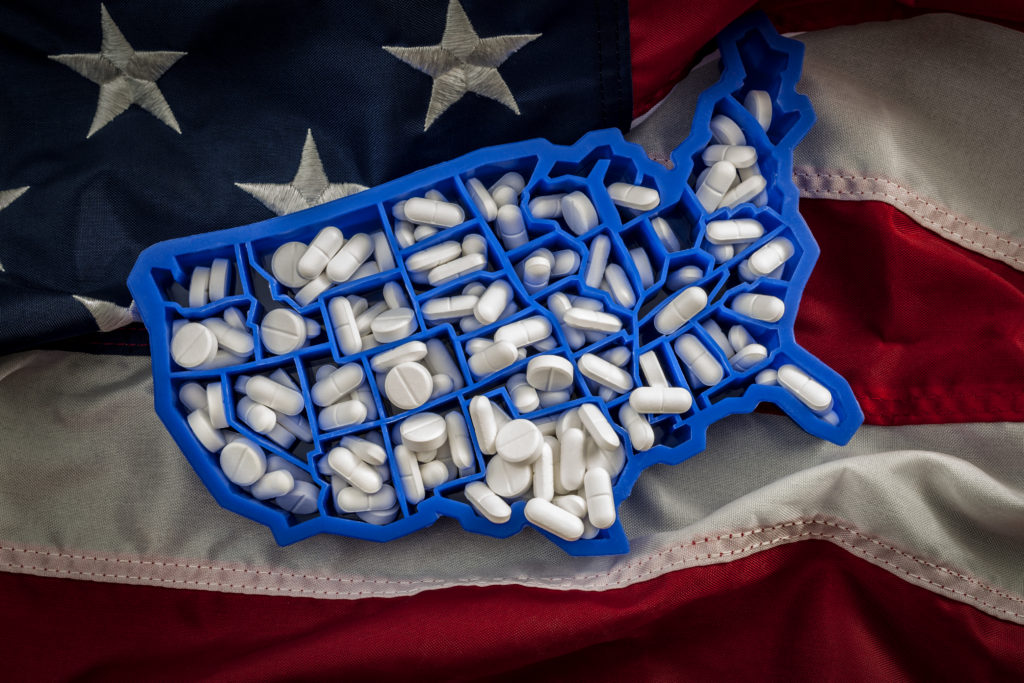(Washington, DC – January 4, 2022) According to a National Center for Health Statistics report released the last week of 2021 using official annual mortality data, 91,799 Americans died from drug overdoses in 2020. This is an astounding 31 percent increase over the 2019 rate and the largest year-over-year rate increase on record. Additional data suggests that 2021 drug overdose deaths continued to increase, underscoring the negative impact the COVID-19 pandemic has had on the health and well-being of Americans.
The increases in drug deaths occurred nationally, spanning age, sex, and racial/ethnic groups. In both 2019 and 2020, the highest overdose deaths rates were for American Indian/Alaska Native people and the largest percentage increase in drug overdose death rates from 2019 to 2020 were seen in Black and Native Hawaiian/Other Pacific Islander people. These data show again the urgent need for comprehensive action to address the nation’s growing substance misuse crisis among diverse populations.
Additional analysis by Trust for America’s Health (TFAH) and Well Being Trust (WBT) of state-level data show nearly all states and the District of Columbia saw increases between 2019 and 2020, including very large ones for many states.
- Five states—Kentucky, Louisiana, Mississippi, South Carolina, and West Virginia—had drug overdose death rates that increased by more than 50 percent between 2019 and 2020.
- Just seven states had increases under 10 percent, including three states (Delaware, New Hampshire, and South Dakota) that saw declines.
“The long-term and recent trends in drug overdoses are alarming, and require more attention from policymakers,” said J. Nadine Gracia, M.D., MSCE, President and CEO of Trust for America’s Health. “As we continue to respond to and work to recover from the pandemic, we must take a comprehensive approach that includes policies and programs that reduce overdoses and help Americans suffering from addiction. Policies that address social, economic, and environmental disadvantage, such as childhood trauma, poverty, and discrimination, are needed to help change the trajectory of alcohol, drug, and suicide deaths in the coming decades.”
Over the last five years, TFAH and WBT have released as series of reports on “deaths of despair” called Pain in the Nation: The Drug, Alcohol and Suicides Epidemics and the Need for a National Resilience Strategy, which include data analysis and recommendations for evidence-based policies and programs that federal, state, and local officials. The 2022 Pain in the Nation report will be released in May.
“This comes down to leadership and action. If we don’t move to do something now, these terrible trends will only continue,” said Benjamin F. Miller, PsyD, President of Well Being Trust. “The data are clear— we need to move beyond talk and push for programs and policies that work; and, we need to do so in a way that recognizes that all communities are different and each are going to benefit from a more tailored approach to address this massive problem.”
Key findings by drug-type from the recent NCHS report include:
- Overall drug overdoses deaths: 91,799 Americans died from drug overdoses in 2020, a rate of 28.3 deaths per 100,000 people. This is a rate 31 percent higher than over 2019 when 70,630 Americans died of drug overdoses (21.6 deaths per 100,000).
- Opioid overdose deaths: 68,630 Americans died from opioid overdoses in 2020, a rate of 21.4 deaths per 100,000 people. This is a rate 38 percent higher than 2019 when 49,860 Americans died of opioid overdoses (15.5 deaths per 100,000).
- Synthetic opioid overdose deaths: 56,516 Americans died from synthetic opioid overdoses in 2020, a rate of 17.8 deaths per 100,000 people. That is a rate 56 percent higher than 2019, when 36,359 Americans died of synthetic opioids overdoses (11.4 deaths per 100,000). The rate of synthetic opioid overdose deaths has increased more than fivefold over the past five years.
- Cocaine overdose deaths: 19,447 Americans died from cocaine overdoses in 2020, a rate of 6.0 deaths per 100,000 people. That rate is 22 percent higher than 2019, when 15,883 Americans died of cocaine overdoses (4.9 deaths per 100,000). The rate of cocaine overdose deaths has increased by almost threefold over the past five years.
- Psychostimulant overdose deaths: 23,837 Americans died from psychostimulants in 2020, a rate of 7.5 deaths per 100,000 people. That’s a rate 50 percent higher than 2019, when 16,167 Americans died from psychostimulant overdoses (5.0 deaths per 100,000). The rate of psychostimulants overdose death has increased by fourfold over the past five years.
Additional annual, racial/ethnic, and state-level data can be found below.
Drug Overdose Deaths, 1999-2020
| Year | Deaths | Deaths per 100,000 (Age Adjusted) |
| 1999 | 16,849 | 6.1 |
| 2000 | 17,415 | 6.2 |
| 2001 | 19,394 | 6.8 |
| 2002 | 23,518 | 8.2 |
| 2003 | 25,785 | 8.9 |
| 2004 | 27,424 | 9.4 |
| 2005 | 29,813 | 10.1 |
| 2006 | 34,425 | 11.5 |
| 2007 | 36,010 | 11.9 |
| 2008 | 36,450 | 11.9 |
| 2009 | 37,004 | 11.9 |
| 2010 | 38,329 | 12.3 |
| 2011 | 41,340 | 13.2 |
| 2012 | 41,502 | 13.1 |
| 2013 | 43,982 | 13.8 |
| 2014 | 47,055 | 14.7 |
| 2015 | 52,404 | 16.3 |
| 2016 | 63,632 | 19.8 |
| 2017 | 70,237 | 21.7 |
| 2018 | 67,367 | 20.7 |
| 2019 | 70,630 | 21.6 |
| 2020 | 91,799 | 28.3 |
Source: National Vital Statistics System, National Center for Health Statistics
Drug Overdose Deaths by Racial/Ethnic Groups, 2019-2020
| Racial/Ethnic Group | 2019 Deaths | 2019 Deaths Per 100,000 (Age Adjusted) | 2020 Deaths | 2020 Deaths Per 100,000 (Age Adjusted) | Change in Death Rate, 2019–2020 |
| Non-Hispanic White | 50,044 | 26.2 | 62,312 | 33.1 | 26% |
| Non-Hispanic Black | 10,517 | 24.8 | 15,256 | 35.8 | 44% |
| Non-Hispanic American Indian/ Alaska Native | 723 | 30.5 | 1,009 | 42.5 | 39% |
| Non-Hispanic Asian | 679 | 3.3 | 935 | 4.6 | 39% |
| Non-Hispanic Native Hawaiian/ Other Pacific Islander | 58 | 9.5 | 86 | 13.7 | 44% |
| Hispanic | 7,473 | 12.7 | 10,606 | 17.6 | 39% |
Source: National Vital Statistics System, National Center for Health Statistics
Drug Overdose Deaths by State, 2019-2020
| State | 2019 Deaths | 2019 Deaths Per 100,000 (Age Adjusted) | 2020 Deaths | 2020 Deaths Per 100,000 (Age Adjusted) | Change in Death Rate, 2019–2020 |
| Alabama | 768 | 16.3 | 1029 | 22.3 | 37% |
| Alaska | 132 | 17.8 | 160 | 22.0 | 24% |
| Arizona | 1907 | 26.8 | 2550 | 35.8 | 33% |
| Arkansas | 388 | 13.5 | 546 | 19.1 | 41% |
| California | 6198 | 15.0 | 8908 | 21.8 | 46% |
| Colorado | 1079 | 18.0 | 1492 | 24.9 | 38% |
| Connecticut | 1214 | 34.7 | 1371 | 39.1 | 13% |
| Delaware | 435 | 48.0 | 444 | 47.3 | -2% |
| D.C. | 311 | 43.2 | 424 | 58.1 | 34% |
| Florida | 5268 | 25.5 | 7231 | 35.0 | 37% |
| Georgia | 1408 | 13.1 | 1916 | 18.0 | 38% |
| Hawaii | 242 | 15.9 | 274 | 18.3 | 15% |
| Idaho | 265 | 15.1 | 287 | 15.9 | 5% |
| Illinois | 2790 | 21.9 | 3549 | 28.1 | 28% |
| Indiana | 1699 | 26.6 | 2321 | 36.7 | 38% |
| Iowa | 352 | 11.5 | 432 | 14.3 | 25% |
| Kansas | 403 | 14.3 | 490 | 17.4 | 22% |
| Kentucky | 1380 | 32.5 | 2083 | 49.2 | 51% |
| Louisiana | 1267 | 28.3 | 1896 | 42.7 | 51% |
| Maine | 371 | 29.9 | 496 | 39.7 | 33% |
| Maryland | 2369 | 38.2 | 2771 | 44.6 | 17% |
| Massachusetts | 2210 | 32.1 | 2302 | 33.9 | 6% |
| Michigan | 2385 | 24.4 | 2759 | 28.6 | 17% |
| Minnesota | 792 | 14.2 | 1050 | 19.0 | 34% |
| Mississippi | 394 | 13.6 | 586 | 21.1 | 55% |
| Missouri | 1583 | 26.9 | 1875 | 32.1 | 19% |
| Montana | 143 | 14.1 | 162 | 15.6 | 10% |
| Nebraska | 161 | 8.7 | 214 | 11.3 | 30% |
| Nevada | 647 | 20.1 | 832 | 26.0 | 29% |
| New Hampshire | 407 | 32.0 | 393 | 30.3 | -5% |
| New Jersey | 2805 | 31.7 | 2840 | 32.1 | 1% |
| New Mexico | 599 | 30.2 | 784 | 39.0 | 29% |
| New York | 3617 | 18.2 | 4965 | 25.4 | 39% |
| North Carolina | 2266 | 22.3 | 3146 | 30.9 | 39% |
| North Dakota | 82 | 11.4 | 114 | 15.6 | 37% |
| Ohio | 4251 | 38.3 | 5204 | 47.2 | 23% |
| Oklahoma | 645 | 16.7 | 762 | 19.4 | 17% |
| Oregon | 615 | 14.0 | 803 | 18.7 | 34% |
| Pennsylvania | 4377 | 35.6 | 5168 | 42.4 | 19% |
| Rhode Island | 307 | 29.5 | 397 | 38.2 | 29% |
| South Carolina | 1127 | 22.7 | 1739 | 34.9 | 54% |
| South Dakota | 86 | 10.5 | 83 | 10.3 | -2% |
| Tennessee | 2089 | 31.2 | 3034 | 45.6 | 46% |
| Texas | 3136 | 10.8 | 4172 | 14.1 | 31% |
| Utah | 571 | 18.9 | 622 | 20.5 | 8% |
| Vermont | 133 | 23.8 | 190 | 32.9 | 38% |
| Virginia | 1547 | 18.3 | 2240 | 26.6 | 45% |
| Washington | 1259 | 15.8 | 1733 | 22.0 | 39% |
| West Virginia | 870 | 52.8 | 1330 | 81.4 | 54% |
| Wisconsin | 1201 | 21.1 | 1531 | 27.7 | 31% |
| Wyoming | 79 | 14.1 | 99 | 17.4 | 23% |
Source: TFAH and WBT analysis of data from the National Center for Health Statistics
Trust for America’s Health is a nonprofit, nonpartisan organization that promotes optimal health for every person and community and makes the prevention of illness and injury a national priority. www.tfah.org Twitter:@HealthyAmerica1
Well Being Trust is a national foundation dedicated to advancing the mental, social, and spiritual health of the nation. Created to include participation from organizations across sectors and perspectives, Well Being Trust is committed to innovating and addressing the most critical mental health challenges facing America, and to transforming individual and community well-being. www.wellbeingtrust.org. Twitter: @WellBeingTrust






